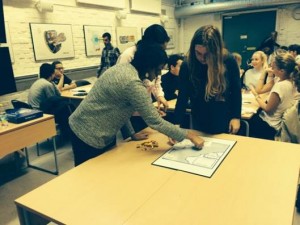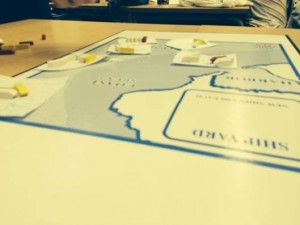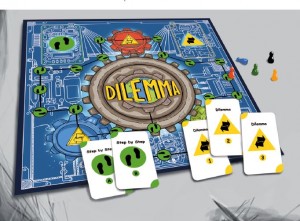Today, I gave a talk at the KTH Sustainability Education Day 2015 on the work with the course module that I have designed and been teaching for the last few years at the Royal Institute of Technology: Introduction to Sustainable Development. My impression was that there was a large interest in the module and there may also be a general interest to people outside KTH. Therefore, I have written a description of the module, which I publish here.
The Introduction to Sustainable Development course module is a mini-course corresponding to 1,5 ECTS (approximately one week’s effort for the students), which can be embedded as a part of a larger course. In many cases, I am hired to give this module as part of an introduction course in the first year of an Engineering Degree programme. This is a really good way to introduce sustainability for the engineering students and meanwhile emphasise the connection of sustainability to their future profession as engineers.
The module curriculum covers:
- Introduction coupled to the need to use resources within limits; the history of the concept of sustainable development; some common definitions of the concept and how they differ; the three dimensions and various ways to describe those and relate them to each other;
- Identification of complexity, transdisciplinarity and respect for different perspectives as some key issues in sustainability;
- Discussions on sustainability challenges; planetary boundaries; social boundaries;
- Technology and sustainability; strategies for sustainability – for the company and for society; good examples;
There are five class room activities:
- Lecture I: covering mainly the first three of the bullets above
- Seminar I: the Fish Banks board game
- Seminar II: the Dilemma board game, part 1
- Seminar III: the Dilemma board game, part 2
- Lecture II: covering mainly the last of the bullets above
Literature used is the text book “Sustainable Development – an Introduction for Engineers” (Jon-Erik Dahlin, Studentlitteratur, ISBN 9789144092669) together with references to papers and reports.
Assessment is in the form of:
- Three small written assignments, one for each of the seminars; students should demonstrate critical thinking and reflection by formulating arguments and counterarguments.
- Written test; computerised multiple choice style as an additional incentive for reading the literature.
Class room activities in the module are highly interactive, both the lectures and the seminars, during which we play several board games. The Fish Banks game and the Dilemma game have different and complementary learning objectives, but both spawn discussions, interaction, and competition as well as cooperation.
In Fish Banks, students form teams that take on the role of fishing companies. They can order and trade with fishing ships and have to decide where to send their ships to fish. Teams need to make strategic decisions with limited access to information. The game demonstrates the tragedy of the commons phenomenon, typically ending with overfishing of the ocean. In the debriefing we discuss the student’s experiences and their explanations to why thing took the course it did. We reflect upon how complexity and system dynamics affects their decisions and relate to what other situations in life and society there are where similar processes may take place.
The Fish Banks board game is a highly interactive teaching tool.
In Dilemma, students have to answer quiz questions on sustainability facts, and argue for or against certain positions regarding moral dilemmas on various sustainability issues. Quiz questions may be easier to answer for those that have taken in the text book literature before they came to the seminar, but various clues found in the game may help those with less knowledge to progress on the board (with a slower paste though). Moral dilemmas in the game are polarised with two opposing positions and players may have to argue for a position they do not agree on – which of course is a very interesting and enlightening experience. In the debriefing we pick a few of those dilemmas and lift the level of discussion somewhat, realising that many dilemmas in reality may be grey rather than black or white even though they are often polarised in the public media debate. We play Dilemma two or three times during the module, each time with a different set of moral dilemmas.
The Dilemma board game is a quiz-like board game for 3-5 players, and a fun way to learn about sustainable development.
The experience from giving this module to 600-800 students on a yearly basis for several years is that they like the interactivity, both with the teacher and with their peers. They like the framework of playfulness that the games give but understand seriousness of the subject. Besides a rather thorough introduction to the subject of sustainability, the main lessons learnt from this module are that complexity and system dynamics can make both consequence analysis and decision making difficult but that both are essential in sustainability leadership; and that respect for differences, transdisciplinarity and communication are all necessary for a truly sustainable development.



